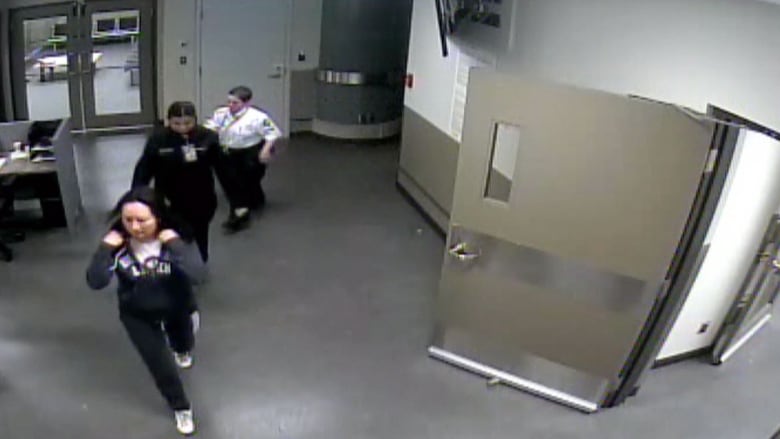CSIS predicted Meng Wanzhou's arrest would cause 'shock waves' and trouble for Canada: court documents
Lawyers for Huawei executive claim security documents are proof authorities conspired against Meng

The Canadian Security Intelligence Service predicted Meng Wanzhou's arrest in December 2018 would send "shock waves" around the world and have significant consequences for Canada, according to newly released federal court documents.
The heavily redacted report is included in documents related to a federal court battle between Canada's attorney general and Meng's defence team over the disclosure of details which the government claims are privileged because of national security concerns.
They will form part of her claim that her arrest was an abuse of the legal process, as she continues to await a hearing on her possible extradition to the U.S.
The CSIS report, disclosed as part of Meng's extradition proceedings, also shows CSIS got a heads-up from the U.S. Federal Bureau of Investigation about her arrest on Dec. 1, 2018, at Vancouver International Airport, saying "advanced communication to CSIS came from the FBI." Lawyers for the Huawei executive claim those details suggest authorities conspired against her.
"The arrest is likely to send shock waves around the world and is certain to be a significant bilateral (Canada/China; U.S./China) issue," the CSIS report says.
Offence considered crime in Canada
The 48-year-old chief financial officer was arrested on an extradition warrant after arriving in Canada on a flight from Hong Kong. She was supposed to be on a stopover to Mexico City, with an ultimate destination of Argentina.
Meng, the daughter of Huawei's billionaire founder Ren Zhengfei, is charged with fraud in the U.S. in relation to allegations that she lied to an HSBC banker in Hong Kong in 2013 about the telecommunication giant's control of a company that was in violation of U.S. economic sanctions against Iran.

Prosecutors claim that by relying on Meng's alleged lies, banks put themselves at risk of prosecution and loss by handling Huawei's finances in further violation of the U.S. sanctions.
Meng has denied any wrongdoing.
Last month, she lost a key battle in the extradition process when a B.C. Supreme Court judge ruled that the offence she is accused of would be considered a crime in Canada. The decision on so-called double criminality clears the way for Meng's extradition hearing to continue.
Violation of rights alleged
The new federal court documents relate to the next stage of Meng's fight, in which she intends to claim that her Charter rights were violated at the time of her arrest.
Dates for hearings on an abuse of the legal process are likely to be set next week.
In those hearings, Meng's lawyers say they will attempt to prove that American and Canadian authorities conspired against their client to conduct a "covert criminal investigation."

The CSIS documents were released in response to an earlier set of hearings in which Meng's lawyers were able to prove that there was an "air of reality" to her claims.
The defence team claims that although there was a warrant for Meng's "immediate" arrest, Canada Border Services Agency officers held her for three hours before RCMP took her into custody. During that time, they seized Meng's phones and electronic devices, later giving the passcodes to RCMP in error.
Meng's lawyers claim police took note of the electronic identification numbers associated with Meng's phones and tablets. They say that passing that information on to the FBI would be a violation of the Extradition Act.
The CSIS report says "FBI will not be present" at Meng's arrest "in order to avoid the perception of influence." Her lawyers claim that statement and others are proof CSIS was "conscious of obscuring the involvement of the FBI."
Prediction of trouble for Canadians in China
Another CSIS document written after Meng's arrest specifically notes the arrest of Canadians Kevin and Julia Garratt in China following the 2014 arrest in Canada of Su Bin, a Chinese citizen and B.C. resident who was accused of stealing U.S. military secrets through hacking.
Su was extradited to the U.S. in 2016 and jailed for nearly four years. The Garratts had lived in China for 30 years prior to their arrest on unproven allegations of espionage. Julia Garratt spent five months in jail before being released on bail. Kevin Garratt was detained for more than two years.
In the days after Meng's arrest, Chinese authorities detained two Canadians, former diplomat Michael Kovrig and entrepreneur Michael Spavor.

The two men have been in Chinese custody ever since, and have been accused by the Chinese of spying.
Canada has called their detention arbitrary, and many experts see the move as retribution for Meng's arrest on Canadian soil. Canada's foreign affairs minister has said that securing the release of the two men is Canada's top priority.
China has repeatedly called on Canada to release Meng and expressed anger about the case.
China has also taken steps to cut off Canadian exports of canola and meat in the wake of the extradition proceedings.
This week, a federal court judge appointed Toronto lawyer Anil Kapoor as an amicus curiae, or "friend of the court," who will be able to attend court hearings related to arguments held out of public view over the release of documents that could have national security implications.
Meng's lawyers had argued for Kapoor's appointment, as the defence team will not be allowed to attend the in-camera portions of the hearings. They claim that having a third party whose job is to advise the court will ensure that Meng's interests are met at the proceedings.
Meng has been living under a form of house arrest since she was released on $10 million bail in Vancouver. She owns two multimillion-dollar homes on the city's west side and is trailed around the clock by security guards.

